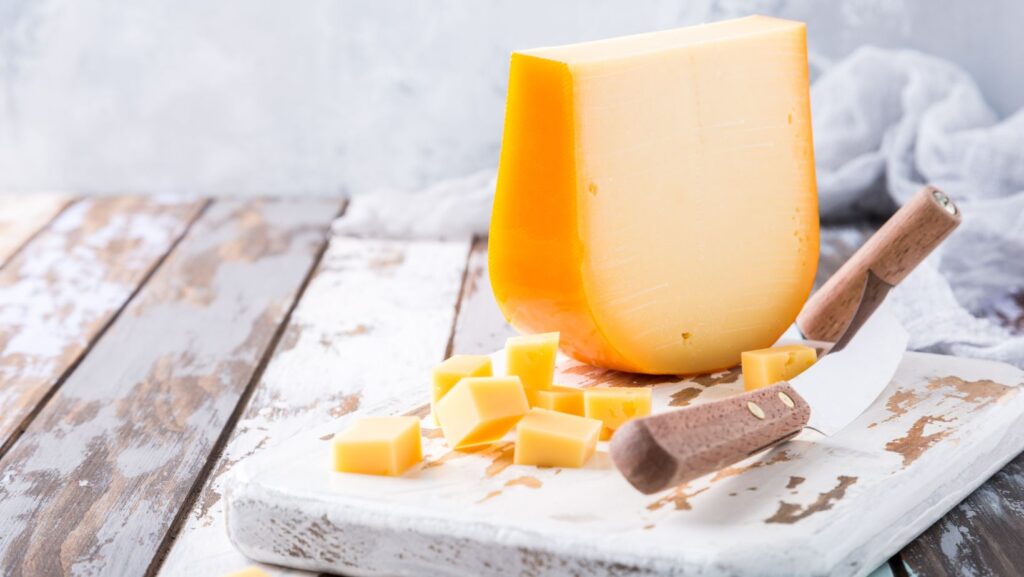Ever wondered why Gouda cheese is a staple in many kitchens? It’s not just for its creamy, nutty flavor, but also for the impressive nutritional benefits it offers. This Dutch-origin cheese, loved globally, is a veritable powerhouse of nutrients that can contribute to a healthier diet.
In this article, we’ll delve into the fascinating world of Gouda cheese nutrition facts. From its protein content to its rich supply of vitamins and minerals, you’ll discover why adding a slice or two of Gouda to your meals can be a smart choice. So, get ready to explore the nutritional profile of this beloved cheese and see how it can fit into your balanced diet.
An in-depth look at Gouda cheese nutrition offers unique insights into this dairy product’s nutritious make-up. Regarding a balanced diet, Gouda presents vital nutrients across diverse food groups contributing to optimal dietary health.
Gouda Cheese Nutrition Facts
Gouda cheese offers a wide range of necessary nutrients that are beneficial to health. Protein tops the charts, offering about 25 grams per 100  grams of cheese. Complementarily, Gouda’s rich in fat, boasting an average of around 27 grams per 100 grams, predominantly saturated fats. Essential vitamins, like Vitamin A and Vitamin B-12, permeate this dairy delight, aiding in multiple bodily functions such as maintaining eye health and preventing anemia.
grams of cheese. Complementarily, Gouda’s rich in fat, boasting an average of around 27 grams per 100 grams, predominantly saturated fats. Essential vitamins, like Vitamin A and Vitamin B-12, permeate this dairy delight, aiding in multiple bodily functions such as maintaining eye health and preventing anemia.
On the mineral front, Gouda stages a comprehensive offering. Calcium, 700 milligrams per 100 grams of cheese, promotes bone health. Phosphorus, around 500 milligrams in the same quantity, collaborates with calcium to strengthen bones. Moderate amounts of Zinc and Selenium, trace elements which are less than 1 milligram per 100 grams, variously contribute to immune health and antioxidant protection.
Understanding Serving Sizes
A proper grasp of serving sizes remains crucial to get the maximum nutrient benefit without going overboard on calories, fats, or sodium. A standard serving of Gouda cheese equates to around 28 grams, approximately the size of a pair of four-sided dice.
This serving size offers about 110 calories and 7 grams of fat. The same portion delivers around 7 grams of protein. Vitamins and minerals, though fewer in these smaller quantities, continue to contribute their health-enhancing properties.
Health Benefits of Gouda Cheese
In relation to its nutritional content, Gouda cheese provides an array of health benefits. Not only does it harbor essential nutrients, but its key components contribute to overall wellness in significant ways.
Bone Health and Calcium Content
Gouda cheese, it’s known for its calcium richness. The cheese houses an impressive value of approximately 700 milligrams per 100-gram serving. Now, let’s place that into perspective; that’s a whopping 70% of the recommended daily calcium intake.
What’s more, calcium isn’t just essential for bone health. It also plays an integral role in numerous bodily functions such as muscle contractions and blood clotting.
In the event of calcium deficiency, adding Gouda cheese to the diet is highly advantageous. The calcium therein helps maintain bone density, reducing the risk of bone-related ailments such as osteoporosis.
Vitamin K2 and Heart Health
Another nutritional superstar found in Gouda cheese is vitamin K2 – not to be mistaken with K1, which is more prevalent in leafy greens. A 100-gram serving of Gouda offers about 76 micrograms of vitamin K2, accounting for a colossal 65% of the daily requirement.
While one might question the importance of K2, research indicates it directs calcium towards the bones, keeping it out of the arteries. Therefore, K2 plays a critical role in heart health by preventing calcium build-up known to cause arteriosclerosis, a condition that contributes to heart disease.
Protein and Muscle Maintenance
Gouda contains a substantial amount of protein, with around 25 grams per 100-gram serving, fulfilling 50% of the daily recommended intake. Protein, vital for the body’s functioning, helps in the repair and building of tissues, among numerous other roles.
Regular intake of Gouda cheese would not only help meet daily protein needs but also aid in muscle maintenance.
